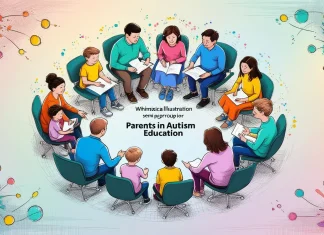Empowering Support and Protection
Autistic children require specialized care and support to navigate their unique challenges and thrive in society. Guardian advocacy serves as a crucial avenue for ensuring their well-being, rights, and interests are safeguarded. In this article, we delve into the concept of guardian advocacy, its significance in the lives of autistic children, the legal process involved, responsibilities of guardian advocates, challenges they face, and tips for selecting the right advocate. By understanding the benefits of guardian advocacy and the empowering role it plays, parents and caregivers can make informed decisions to enhance the lives of their autistic children.
Understanding Guardian Advocacy
Defining Guardian Advocacy
Guardian advocacy refers to a legal mechanism that provides a framework for parents or caregivers to assume decision-making authority and protect the interests of individuals with developmental disabilities, such as autism. It is designed to support individuals who lack the ability to make important life decisions independently.
The Purpose of Guardian Advocacy
The primary purpose of guardian advocacy is to secure the well-being and welfare of autistic children who may require assistance throughout their lives. This legal arrangement aims to ensure their rights are protected and decisions related to medical care, education, and personal matters are made in their best interest.
The Role of Guardian Advocacy for Autistic Children

Providing a Safety Net
Guardian advocacy acts as a safety net for autistic children, offering them guidance, protection, and support in crucial aspects of their lives. It enables parents or caregivers to make decisions on behalf of their children, ensuring their needs are met and their voices are heard.
Advocating for Rights and Services
A guardian advocate becomes the voice and advocate for autistic children, ensuring they receive the rights and services they are entitled to. From educational accommodations to medical care and therapeutic interventions, the advocate plays a pivotal role in securing necessary support systems.
Promoting Independence and Self-Determination
Guardian advocacy also strives to promote independence and self-determination among autistic children. While making decisions on their behalf, the advocate works towards empowering them to develop the necessary skills and autonomy to make informed choices as they grow older.
Benefits of Guardian Advocacy
Legal Protection and Decision-Making Authority
By establishing guardian advocacy, parents or caregivers gain legal protection and the authority to make decisions regarding their autistic children’s welfare. This includes educational choices, healthcare decisions, financial matters, and more.
Continuity of Care
Guardian advocacy ensures a continuum of care for autistic children even after they reach adulthood. It provides a seamless transition from parental care to guardian advocacy, enabling uninterrupted support and guidance throughout their lives.
Individualized Support and Personalized Approach
With a guardian advocate, autistic children receive individualized support tailored to their unique needs and preferences. The advocate works closely with parents, professionals, and service providers to create a personalized plan of care, ensuring the child’s best interests are prioritized.
Legal Process for Establishing Guardian Advocacy
Petitioning the Court
The process of establishing guardian advocacy involves petitioning the court for the appointment of a guardian advocate. This requires submitting necessary documents, including medical evaluations, to demonstrate the need for guardian advocacy.
Evaluation and Determination
The court evaluates the child’s capacity to make decisions independently and determines whether guardian advocacy is necessary. The evaluation may involve assessments by medical professionals, psychologists, and other experts.
Appointment of Guardian Advocate
Once the court approves the petition, a guardian advocate is appointed. The advocate assumes legal authority and responsibilities as outlined by the court, acting in the best interest of the autistic child.
Responsibilities and Duties of a Guardian Advocate
Decision-Making and Consent
One of the primary responsibilities of a guardian advocate is making decisions on behalf of the autistic child. This includes medical treatments, therapies, educational plans, and other crucial aspects requiring consent.
Safeguarding Rights and Interests
A guardian advocate safeguards the rights and interests of the autistic child, ensuring their well-being and needs are met. They monitor service providers, educational programs, and healthcare options to maintain a high standard of care.
Collaboration and Communication
Collaboration and communication are key duties of a guardian advocate. They work closely with parents, educators, healthcare professionals, and service providers to ensure coordinated efforts and a holistic approach to the child’s care and development.
Challenges Faced by Guardian Advocates

Navigating Complex Systems
Guardian advocates often face the challenge of navigating complex systems, such as legal processes, healthcare bureaucracies, and educational systems. Understanding these systems and advocating effectively within them can be demanding and time-consuming.
Balancing Responsibilities
Guardian advocates must balance their responsibilities as decision-makers while respecting the autonomy and rights of the autistic child. Striking the right balance can sometimes be challenging, requiring careful consideration and consultation with professionals.
Emotional Toll and Advocacy Fatigue
Advocacy can take an emotional toll on guardian advocates, as they witness the challenges faced by autistic children and their families. It is important for advocates to prioritize self-care and seek support to prevent burnout and advocacy fatigue.
Tips for Choosing a Guardian Advocate
Evaluate Experience and Expertise
When selecting a guardian advocate for an autistic child, it is crucial to evaluate their experience and expertise in working with individuals with developmental disabilities. Look for advocates with a track record of successfully navigating the legal and healthcare systems.
Compatibility and Trust
Establishing compatibility and trust with a guardian advocate is essential. Engage in open and honest communication, and ensure the advocate shares your values, understands your child’s needs, and can effectively communicate on their behalf.
Seek Recommendations and References
Seek recommendations and references from other families who have utilized guardian advocacy services. Their experiences and insights can help you make an informed decision and find an advocate who is a good fit for your child and family.
Empowering Autistic Children through Guardian Advocacy
Encouraging Self-Advocacy Skills
Guardian advocacy should focus on empowering autistic children to develop self-advocacy skills. Encourage them to express their preferences, make choices within their capabilities, and participate in decision-making processes to foster independence and confidence.
Education and Awareness
Promote education and awareness about autism and guardian advocacy within your community. By raising awareness, you contribute to a more inclusive and supportive environment that understands and respects the rights and needs of autistic individuals.
Resources and Support for Guardian Advocates
Support Groups and Networks
Joining support groups and networks for guardian advocates can provide valuable resources, guidance, and emotional support. Connect with other advocates to share experiences, learn from one another, and navigate the challenges together.
Professional Assistance
Seeking professional assistance from lawyers, special education consultants, and therapists can greatly assist guardian advocates. These professionals can provide legal guidance, educational expertise, and therapeutic interventions to enhance the child’s well-being.
Success Stories of Guardian Advocacy
Case Study 1: Transforming Educational Opportunities
In one success story, a guardian advocate successfully navigated the educational system to secure appropriate accommodations for an autistic child. This resulted in improved access to specialized programs and services, leading to significant progress in the child’s academic and social development.
Case Study 2: Ensuring Continuity of Care
Another success story involved a guardian advocate ensuring continuity of care for an autistic individual transitioning into adulthood. By carefully coordinating services, the advocate facilitated a seamless transition, enabling the individual to maintain a stable and fulfilling life.
Conclusion
Guardian advocacy plays a vital role in supporting and protecting the rights and well-being of autistic children. By understanding the legal process, the responsibilities of a guardian advocate, and the benefits it offers, parents and caregivers can make informed decisions to enhance the lives of their autistic children. Through empowerment, collaboration, and advocacy, guardian advocates can help create a brighter future for autistic individuals.
FAQs
1. Can anyone become a guardian advocate for an autistic child?
- No, becoming a guardian advocate involves a legal process and specific qualifications. It is essential to consult with legal professionals to understand the requirements and eligibility criteria.
2. What is the difference between guardian advocacy and guardianship?
- Guardian advocacy is a specific legal arrangement designed for individuals with developmental disabilities, while guardianship is a broader legal concept that applies to individuals who lack the capacity to make decisions independently.
3. Can a guardian advocate be replaced or changed?
- In some cases, a guardian advocate can be replaced or changed if there are valid reasons and legal procedures are followed. Consult with legal professionals to understand the process specific to your jurisdiction.
4. Are there any financial implications of establishing guardian advocacy?
- The financial implications of guardian advocacy can vary depending on factors such as legal fees and ongoing expenses related to the care of the autistic child. It is advisable to seek financial guidance and explore available resources and support.
5. Can guardian advocacy be established for adults with autism?
- Yes, guardian advocacy can be established for adults with autism if they meet the criteria for needing assistance in decision-making. The legal process may differ depending on the jurisdiction. Consult with legal professionals to understand the options available.



























